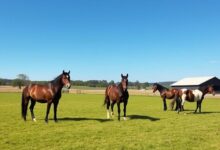Equine Nutrition Guide: Food Name Horse Essentials
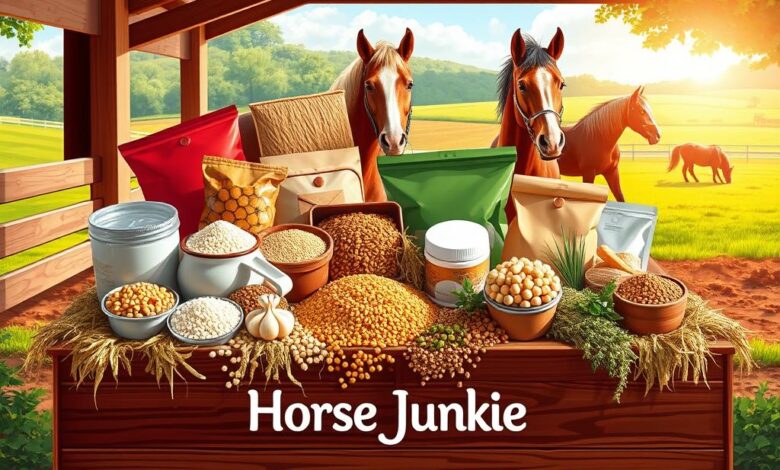
Ever thought about how much diet affects your horse’s health and performance? Knowing what your horse needs to eat is key for any owner. This guide will explore the world of horse feeding, from digestion to nutrition. We aim to give you the tools to choose the right food for your horse and help them stay healthy.
Key Takeaways
- Horses have a small stomach capacity of 2 to 4 gallons, emphasizing the necessity of frequent, smaller meals.
- A horse’s small intestine can digest up to 20% fat, with normal diets containing 3 to 4% fat.
- The cecum, essential for detoxification, is 3 to 4 feet long and holds around 7 to 8 gallons.
- Six main classes of nutrients vital for horses include water, fats, carbohydrates, protein, vitamins, and minerals.
- Alfalfa hay can provide a significant protein source, containing as much as 25-30% protein, crucial for high-performing horses.
Understanding Equine Digestion
Equine digestion is a complex process that makes horses unique. Their digestive system is designed for a high-fiber diet. This is key for their health and nutrition. Horses are non-ruminant herbivores, which affects how they digest food and absorb nutrients.
The Horse’s Unique Digestive System
Horses have a small stomach, about 2-4 gallons. This is the smallest among domestic animals. They need to eat often, in small amounts, because of this.
Their small intestine is 70 feet long and is crucial for nutrient absorption. Food moves quickly through it, reaching the cecum in just 45 minutes after eating.
Types of Digestive Processes
Horses digest food through enzymatic digestion and fermentation. Enzymes in the stomach and small intestine break down food. Then, fermentation in the cecum breaks down cellulose and carbohydrates.
The large intestine, making up 60% of the digestive tract, is also important. It helps with fermentation and nutrient absorption from fibrous material.
Common Digestive Issues in Horses
Despite their digestive system’s efficiency, horses face challenges. Issues like colic and laminitis can arise from diet mistakes or sudden feed changes. It’s important to avoid sudden changes in feed and not overfeed.
These problems can seriously affect a horse’s health. A well-structured nutrition plan is essential.
Essential Nutrients for Horses
Knowing what nutrients horses need is vital for their health and performance. Each nutrient has a special role in growth, development, and well-being. We look at the importance of vitamins and minerals, the protein needs for health, and the role of fiber in their diet.
Importance of Vitamins and Minerals
Vitamins and minerals are key for horses’ health. They help keep bones strong, boost the immune system, and support metabolism. Growing and mature horses have different needs for calcium and phosphorus, with a ratio of 1:1 important for all.
Trace minerals like zinc, copper, and iron are also crucial. They help keep horses healthy and functioning well.
Protein Needs for Optimal Health
Protein is vital for muscle growth and repair. Young horses need 12 to 18 percent crude protein for growth. Alfalfa is a good source of protein, while grass hays have less.
Meeting protein needs is key for a horse’s physical health and performance.
The Role of Fiber in Equine Diet
Fiber is essential for healthy digestion and preventing stomach problems. Horses should eat at least 50% roughage in their diet. They need 1.5% to 2% of their body weight in forages daily for good digestion.
High-fiber diets help digestion and keep the gut healthy. This is important for nutrient absorption.
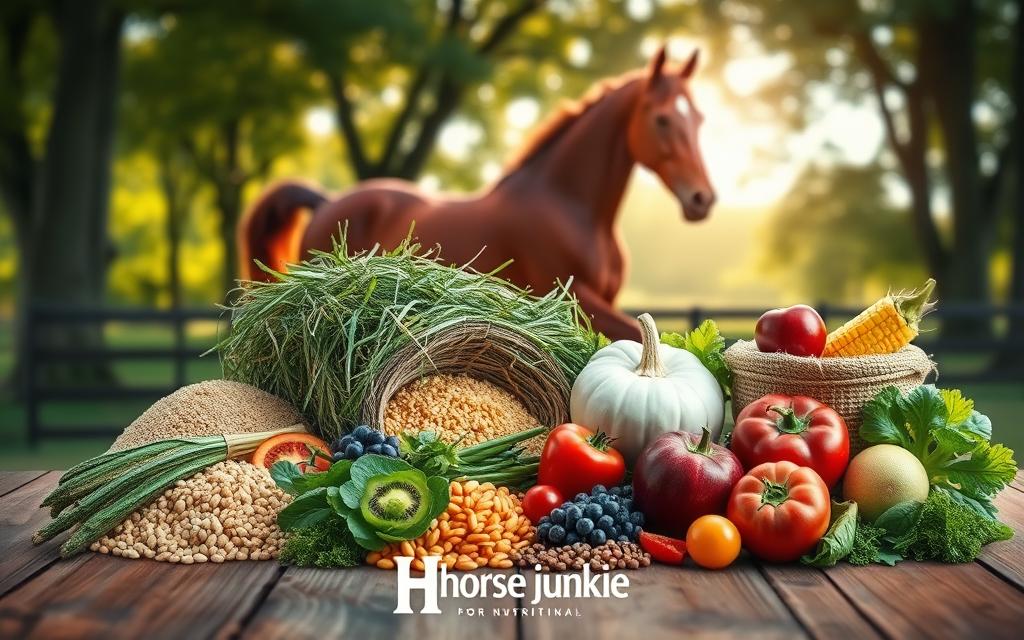
Types of Horse Feed
When we think about the best types of horse feed, it’s important to recognize the various categories available. Each type serves specific purposes and meets different nutritional needs based on the individual horse’s requirements.
Grain-Based Feeds
Grain-based horse diets often include oats, corn, or barley. These provide concentrated energy and essential nutrients. They are especially beneficial for horses with higher energy demands, such as those in training or competition. When incorporating grain into our horse’s diet, we must ensure that the total intake remains balanced to prevent digestive issues.
Forage and Hay Options
Forage options for horses are critical as they form the foundation of any equine diet. Horses should consume a substantial amount of roughage daily, typically around 1.5-2% of their body weight. This means 15-20 pounds of quality hay for a 1,000-pound horse.
Various types of hay, such as timothy, Bermuda grass, and alfalfa, fulfill different nutritional needs. Hay pellets and cubes can be beneficial, especially for horses with dental problems. The moisture content of haylage and other forms ensures proper hydration, particularly for highly active horses.
Complete Feed Formulations
Complete horse feeds encompass all nutritional needs in one product. These formulations include a blend of grains, vitamins, minerals, and probiotics. They are designed to provide a balanced diet without the need for additional supplements.
For horses needing extra protein and energy, concentrates in the form of pellets or grains offer a practical solution. Ration balancers are also useful, ensuring our horses receive adequate vitamins and minerals in smaller portions.
How to Choose the Right Type
Choosing the right types of horse feed depends on several factors. These include our horse’s life stage, health status, and activity level. Before deciding, we should assess the individual horse’s needs and consider any specific dietary requirements.
Taking the time to weigh different hay samples or consulting with a veterinarian can help us make informed decisions. This supports our horse’s overall health and performance.
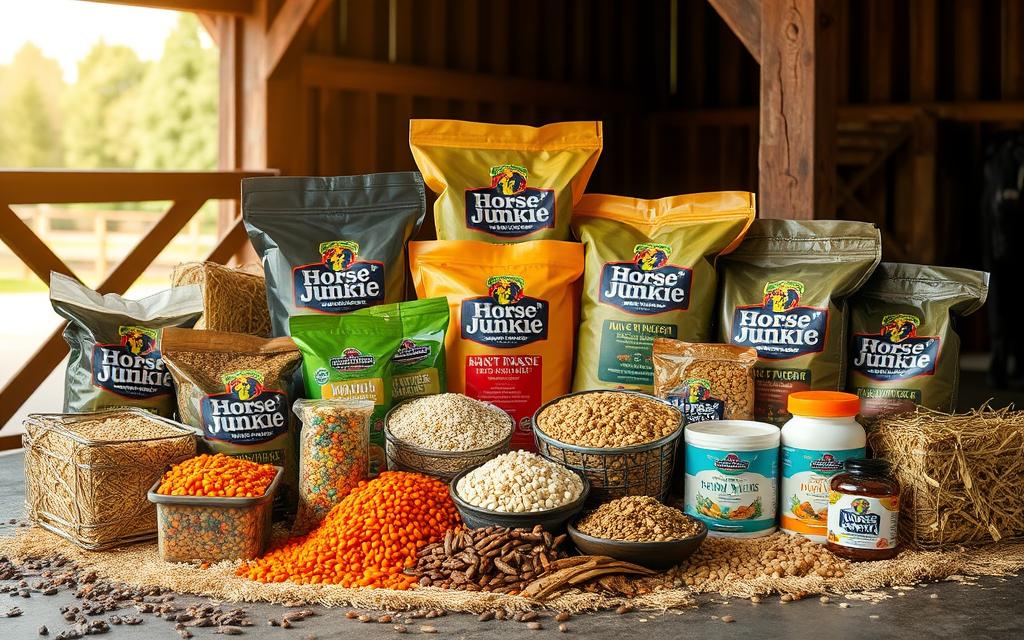
Reading Feed Labels
Understanding feed labels is key for horse owners wanting to give the best nutrition. With many products out there, we need to know how to read horse feed labels well. This means looking at the ingredients list, checking the nutritional analysis, and spotting quality indicators.
Understanding Ingredients List
Reading the ingredients list is vital to know the nutritional value of horse feed. This list shows the ingredients in order, with the first ones being the most. We look for high-quality nutrients and signs of freshness and digestibility.
Ingredients like whole grains, legumes, and quality proteins are good. But, feeds with fillers like corn gluten or artificial additives are not as healthy.
Nutritional Analysis Breakdown
The nutritional analysis for horse feed shows the key nutrients. It lists things like Crude Protein, Crude Fat, and Crude Fiber, plus minerals and vitamins. This ensures our horses get the right nutrition for their needs.
Even though the Association of American Feed Control Officials (AAFCO) sets minimum nutrient levels, some brands offer more. This can help our horses perform better.
Recognizing Quality Indicators
Quality indicators help us judge the value of horse feed. A good product will have clear labeling and show nutrient guarantees and quality ingredients. It should also have research backing its claims.
We should also look at the brand’s quality control efforts. Some companies go beyond what’s required, ensuring their feed is effective. By carefully reading feed labels, we make better choices for our horses’ health.
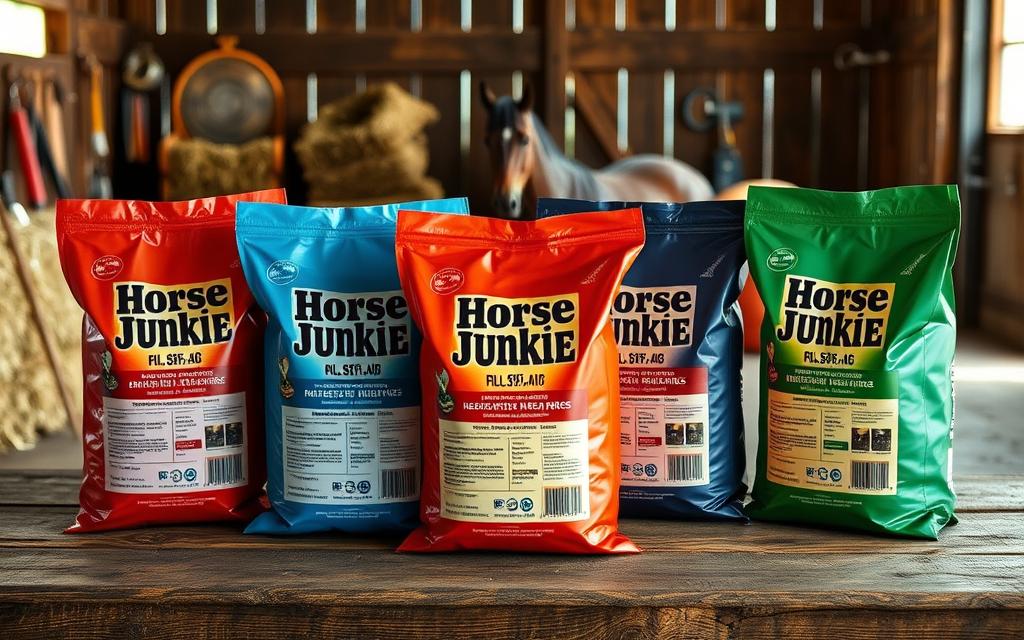
Feeding Schedules and Quantities
Creating a regular feeding schedule is key for our horses’ health. It helps with digestion and overall well-being. Regular feeding times make a stable environment for our horses.
Importance of Consistency
Feeding horses at the same times every day is crucial. It prevents problems like colic and keeps their digestion balanced. Horses like routine, which helps their bodies adjust to regular feeding times.
This predictability helps control their appetite. It also improves how well they absorb nutrients from their food.
Guidelines for Daily Rations
Figuring out how much to feed a horse depends on its weight, age, and how active it is. Generally, a horse needs 1.5% to 3% of its body weight in dry matter daily. Most of their diet should be high-quality forage, like grass or hay.
Here are some tips for daily feeding:
- Forage: Make sure at least 50% of their diet is from pasture or hay.
- Grains: If they don’t get enough forage, limit grains to keep their diet balanced.
- Fresh Water: Always have clean, fresh water available for them.
Adjusting Feed for Performance Needs
When our horses are more active or competing, we need to adjust their feed. We must make sure their diet meets their higher energy and nutritional needs. Here are some things to think about when adjusting their feed:
- Assess Activity Level: Performance horses need richer diets with more calories and nutrients.
- Monitor Body Condition: Check their body condition scores often to avoid overfeeding or under-exercising.
- Quality of Hay: Choose nutrient-dense hays, like alfalfa, for working horses.
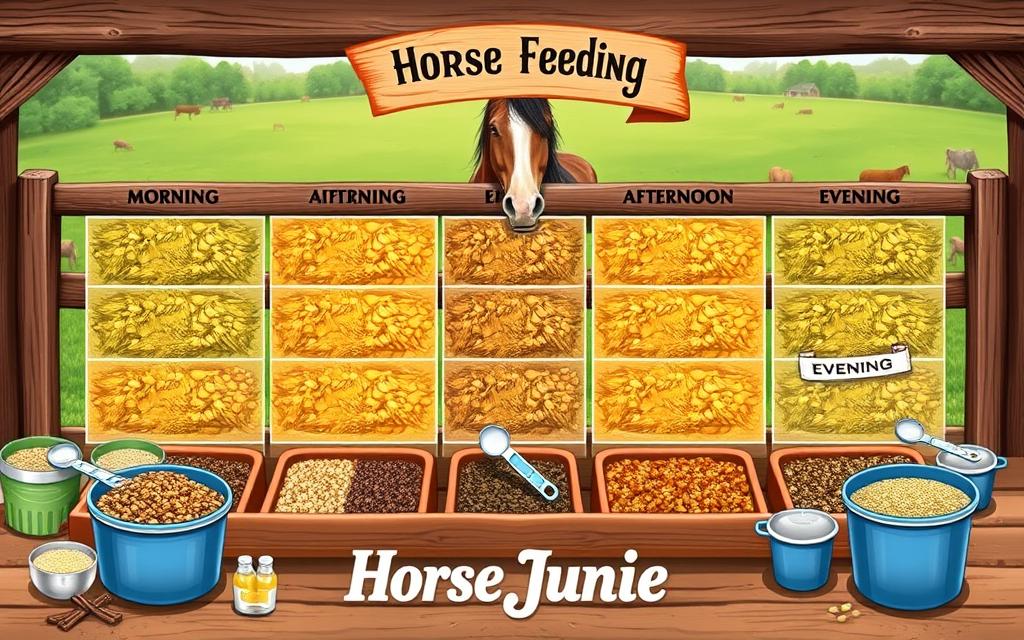
Treats and Supplements for Horses
Choosing the right treats and supplements for our horses is key. They should taste good and help our horses stay healthy. We’ll look at popular treats, when to use supplements, and the good points of natural and commercial options.
Popular Equine Treat Options
There are many treats for horses, meeting their tastes and needs. Here are some favorites:
- Manna Pro Apple Horse Wafers: These tasty wafers are a favorite among many horses, typically priced around $33.99 for a 20 lb bag.
- German Horse Muffin treats: Soft and chewy, these whole grain treats generally cost about $38.19 for a 6 lb package.
- Wild berry horse treats: Offering a low-sugar option, these treats typically range from $17.59 to $21.99 for a 20 lb bag.
- Apple-flavored treats: A delight for our equine companions, these are usually priced at $13.59 for a 3 lb bag.
- Grain-free and low starch options: These range from $8.79 to $22.99, giving us flexibility depending on our horses’ specific diets.
When to Use Supplements
We might use supplements when our horses need extra help. This could be for health issues or to boost performance. Here are some reasons:
- Horses in intensive training programs may benefit from added vitamins and minerals.
- Older horses could require additional joint support or digestive aids.
- We analyze our horses’ nutritional deficiencies through regular veterinary check-ups to determine specific supplements, such as Dr Cheeke’s YQ+ SUPPLEMENT, which averages $34.99 for a 20 lb bag or $67.99 for a 40 lb bag.
Benefits of Natural vs. Commercial Treats
The debate between natural treats for horses and commercial horse treats is ongoing. Both have their benefits:
- Natural treats: These often include simple ingredients like fruits and vegetables, providing essential nutrients without additives.
- Commercial treats: While they can be convenient and tasty, we must be mindful of their sugar content and ingredients. Some treats maintain a sugar level of 12% or lower, a responsible choice for our horses
Using a mix of treats can keep our horses happy and healthy. We aim to find treats that fit well with a balanced diet. By understanding the role of treats and supplements, we can ensure our horses’ well-being.
Special Dietary Needs
It’s important to know what horses need to eat, especially when they’re pregnant or getting older. We must give pregnant mares and their young the right food. Also, we need to make sure older horses get what they need to stay healthy.
Feeding Pregnant and Lactating Mares
Pregnant mares need more food to stay healthy and help their foals grow. They need more energy and certain nutrients. Here are some key things to remember:
- They need more protein, especially when they’re almost ready to give birth, to help the foal grow.
- They also need more minerals like calcium and phosphorus for strong bones.
- It’s best to feed them small meals often to help them digest better.
Nutrition for Young Foals
Young foals grow fast and need special food. Their diet should include:
- More fat and protein to help them grow strong and healthy.
- They should eat often, like 4 to 6 times a day, to keep their energy up.
- They should also have good quality hay to start getting used to different foods.
Senior Horse Diet Considerations
Older horses have different needs. They need food that’s easy to digest and helps keep them healthy. Here are some important points:
- They should eat food that’s easy to digest, with less starch and more fiber.
- They might like high-quality hay or haylage, which is tasty and nutritious.
- It’s important to check how they look and adjust their food as needed.
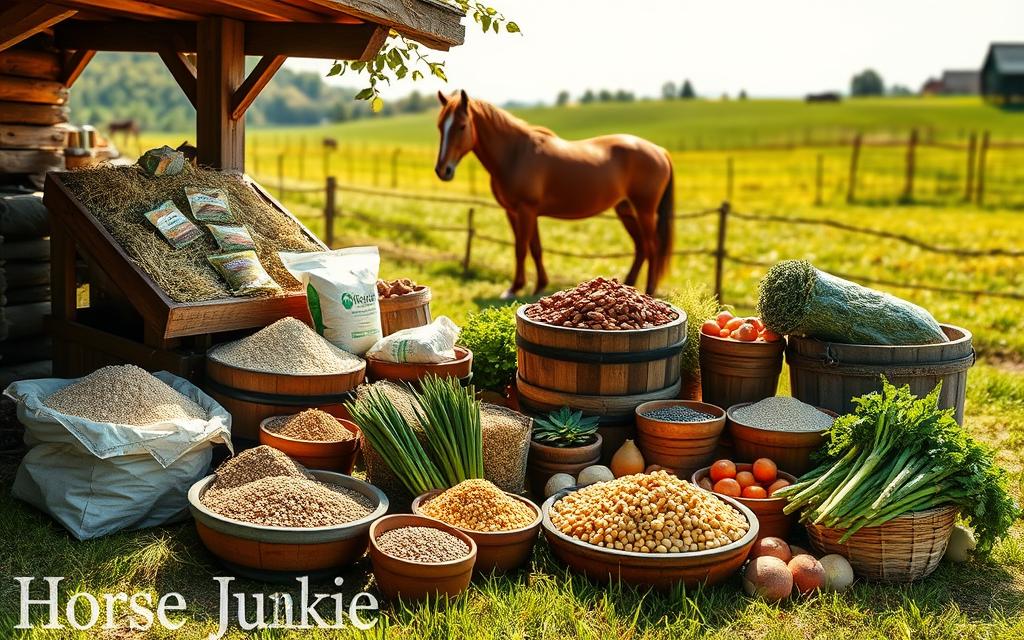
Hydration: The Overlooked Essential
Keeping horses hydrated is key to their health. They need a lot of water each day to stay healthy. Knowing how much water a horse needs helps us keep them well and active.
On average, a horse drinks 10 to 15 gallons of water every day. But, lactating mares or horses in training might drink up to 30 gallons in 24 hours. This is because they need more water.
Daily Water Requirements
Horses should drink 5 to 15 gallons of water each day. This depends on the weather and how active they are. If they don’t get enough water, it can be very dangerous.
It’s crucial to watch how much water our horses drink. This is especially true in hot weather or when they’re working hard.
Signs of Dehydration
Knowing the signs of dehydration in horses is important. We can spot dehydration early by watching for:
- Lethargy and decreased energy levels
- Dry mucous membranes
- Sunken eyes
- Reduced skin elasticity
- Loss of appetite
Spotting these signs early helps us quickly get our horses hydrated again.
Best Practices for Ensuring Hydration
To help our horses stay hydrated, we can follow some best practices:
- Make sure they always have access to clean, fresh water.
- Add electrolytes when they’re working hard or it’s hot outside.
- Try different water sources, like troughs or buckets, to encourage drinking.
- Keep an eye on how much water they drink and adjust as needed.
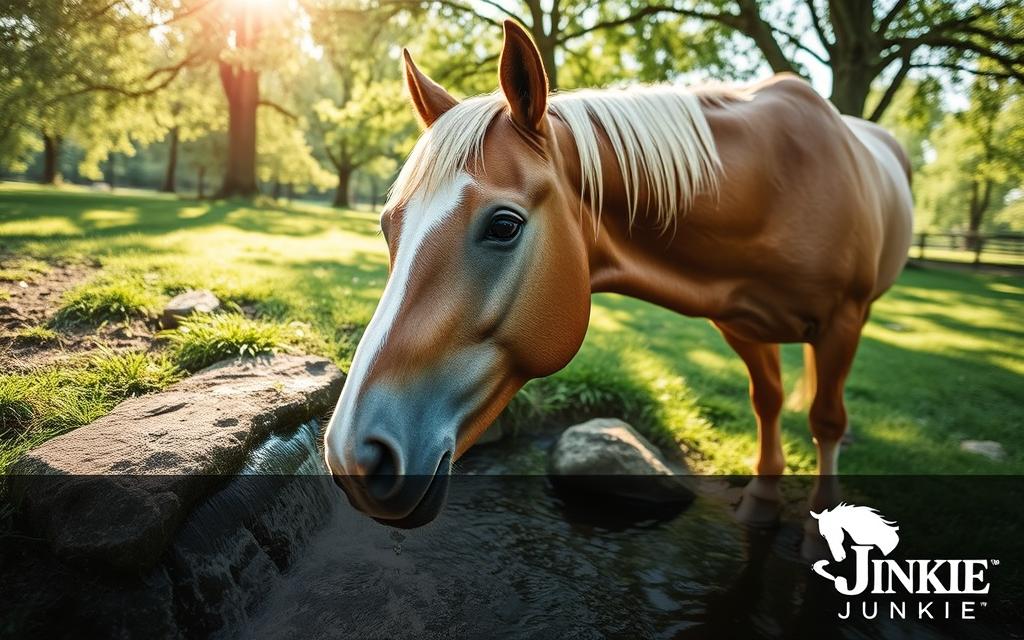
By focusing on hydration and encouraging our horses to drink, we can keep them healthy and ready to perform.
Common Feeding Mistakes
Feeding horses is an art that needs deep understanding of equine nutrition. Many feeding mistakes can harm their health and performance. It’s key to know these mistakes to keep our horses healthy and happy.
Overfeeding vs. Underfeeding
Feeding horses too much can cause obesity, metabolic syndrome, and laminitis. These problems are big worries for young horses, as too much food can harm their joints. Underfeeding, however, can make senior and hardworking horses look gaunt and lead to nutritional issues.
Ignoring Nutritional Balance
Keeping a nutritional balance in horse diet is vital. Not giving the right mix of vitamins, minerals, and forage can cause deficiencies. Too much supplementing can also be harmful, leading to toxicities. It’s important to offer quality hay and watch the grains’ NSC content to avoid laminitis.
Inconsistent Feeding Practices
Unstable feeding habits can upset digestion and cause health problems like colic. We should strive for a consistent feeding schedule. This means giving our horses their food in small, even meals throughout the day. Slowly introducing new foods helps avoid digestive issues.
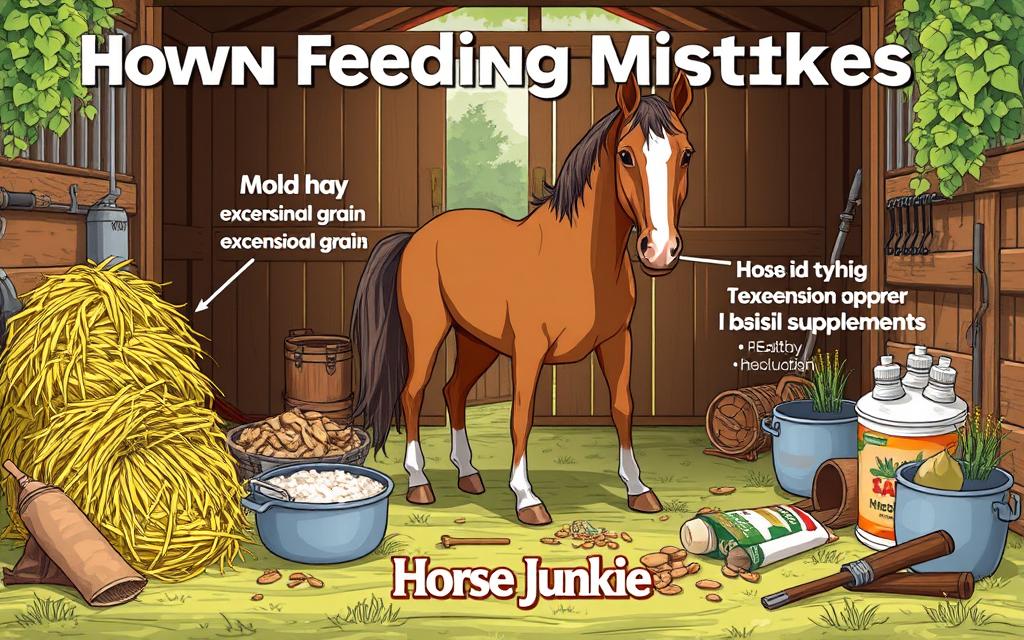
Horse Feeding Myths Debunked
Our understanding of horse feeding is often mixed up by horse feeding myths and misconceptions in horse diet. Each myth makes it hard for horse owners to feed their horses right. By tackling these myths, we can make better choices for our horses.
The Truth About Carrots and Apples
Carrots and apples are thought to be good for horses. But, we need to know the truth about horse treats. These snacks are okay in small amounts, but they shouldn’t replace important nutrients. Horses need lots of fiber from hay and forage, not just treats.
Misconceptions Around Grain Feeding
Many think grain is key for every horse. But, too much grain can cause problems like colic. It’s better to feed a mix of forage and grains, not just lots of grain.
Beliefs About Hay Quality
Not all hay is the same. Some owners think any hay will do, but that’s a hay quality myth. The truth is, good hay is vital for a horse’s health. They need at least 1.5% of their body weight in quality forage every day. Bad hay can lead to health problems.
Feeding Horses for Performance
Understanding the dietary needs of performance horses is key. Nutrition affects their stamina, strength, and health. This is especially true for horses in racing or competitive events. We need to adjust our feeding to support different types of performance horses.
Nutrition for Racehorses
Racehorses need a balanced diet with high energy. High-quality grains are their main energy source. Purina® Omolene® 200 is praised for its benefits, including shiny coats and healthy weight.
This feed has 12% crude protein and controlled starch levels. It helps racing horses stay energized without harming their health.
Diet for Workhorses
Workhorses require a different diet. Their diet should balance carbs and fats for stamina. Feeds like BackHorse Feed or Horse Feed Showman are good choices.
They have 12% crude protein and 18% crude fiber. Adjusting their diet based on their workload boosts performance and health.
Considerations for Competitive Events
Competitive horse feeding is more than just energy. It’s about vitamins, minerals, and amino acids for muscle recovery. The event’s intensity and feeding schedule are crucial.
Tailoring a horse’s diet improves performance and prevents digestive issues. Purina’s nutritional products support muscle development and vitality.
The Future of Equine Nutrition
Looking ahead, innovations in horse feed and sustainable practices are key. We’re learning more about what horses need, leading to better performance and health. For example, Purina’s Omega Match™ Ration Balancing Horse Feed is a big leap. It mimics natural grazing with essential fatty acids and antioxidants, vital for horse health.
Innovations in Horse Feed
The world of horse nutrition is always changing. It’s crucial to keep up with new research and its effects on what we feed our horses. The MQ Equine project by Purina is one such study, looking into diet, living conditions, and genetics on horse health and behavior. Up to 90 percent of horses face stomach issues due to stress, making fiber-rich diets essential for their health.
Sustainable Feeding Practices
Adopting sustainable feeding practices is vital for our horses and the planet. Encouraging foraging is important, as horses need fibrous foods for at least 8 hours a day. This supports their gut health and overall well-being. By adopting these innovative methods, we can make better choices for our horses and the environment.
FAQ
What are the essential nutrients that horses need in their diet?
How often should we feed our horses?
What types of feeds are best for horses?
How can we tell if a horse is dehydrated?
What are some common mistakes to avoid when feeding horses?
Are there special dietary needs for pregnant mares?
Can we give our horses treats? If so, what are healthy options?
What are the signs that my horse has a digestive issue?
How can we recognize quality in horse feed?
What should we consider when feeding performance horses?
Source Links
- The Basics of Equine Nutrition
- A Beginner’s Guide to Equine Nutrition & Feeds
- Digestive Anatomy and Physiology of the Horse
- Understanding a horse’s digestive system | UGA Forage Extension Team
- Nutritional Requirements of Horses and Other Equids – Nutritional Requirements of Horses and Other Equids – Merck Veterinary Manual
- How to Feed a Horse: Understanding the Basic Principles of Horse Nutrition
- Creating the Right Mix: Understanding Nutrients in a Horse’s Diet
- The 5 Types of Horse Feeds and Concentrates
- The Ultimate Guide To Horse Feed Types | Strathorn Farm Stables
- How to Read a Horse Feed Tag or Label| Purina Animal Nutrition
- Understanding Horse Feed Tags
- What Do Horses Eat? Discover Horse Diets | SPANA
- Selecting Feeds for Horses | Animal & Food Sciences
- Horse Supplements, Healthy Equine Vitamin Treats
- Horse Treats
- Horse Feeding: Everything You Need to Know
- What do horses eat? A guide to feeding and watering
- Horse Feed Management
- Horse Feeding: 8 Essential Things To Know + Equipment Checklist
- Avoid These 10 Common Horse Feeding Mistakes
- What food is not good for horses?
- 8 Horse Feeding Mistakes to Avoid
- Horse Feeding Myths: Facts Vs. Fiction
- 7 Busted Horse Nutrition Myths – Wholesome Equine Nutrition
- 7 Equine Nutrition Myths Busted
- Performance
- Impact® Professional Performance Concentrate Horse Feed | Purina
- Omolene 200 Performance Concentrate Horse Feed | Purina
- Science + Love to Help Horses Thrive
- The Fibre Requirements of Horses and the Consequences and Causes of Failure to Meet Them
- 138 | Travel Better Show Better by Feed Room Chemist: An Equine Nutrition Podcast



